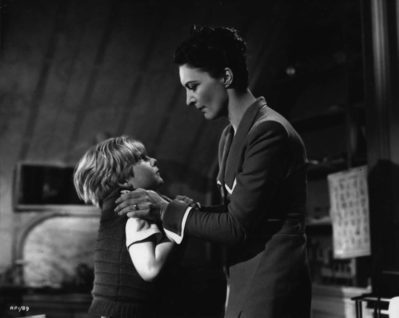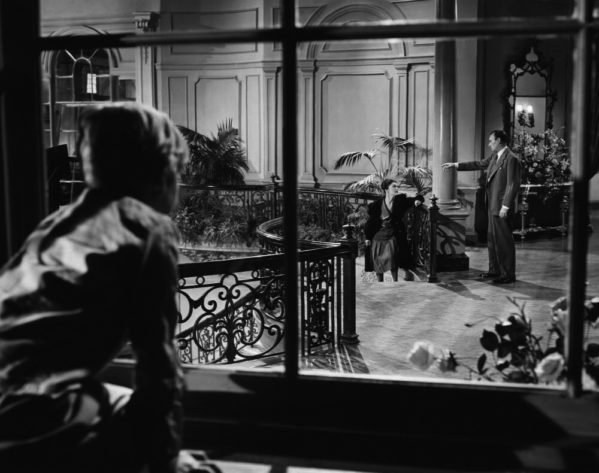REVIEW: ‘Fallen Idol’ teaches the consequences of lying

The Fallen Idol, the noir classic written by Graham Greene and directed by Carol Reed, is a thoughtful study of the power and destruction of lies. The simple narrative is told through the eyes of a young child, Phil (Bobby Henrey), the son of an ambassador living in London. What the boy sees, the audience sees. What the boy hears, the audience hears.
Phil’s best friend is Mr. Baines (Ralph Richardson), the residence’s butler. They spend hours together telling stories, heading to the zoo and talking about snakes and other odd topics that the boy finds fascinating. When Phil picks up on an affair that Mr. Baines is having with an embassy employee (Michèle Morgan), he is faced with his first run-in with the power of lying. Mr. Baines asks Phil not to tell Mrs. Baines (Sonia Dresdel) about his friend they saw at a local cafe, and the boy obliges. In fact, the boy is seemingly happy to protect his good friend the butler, but this loyalty is put to the test when Mrs. Baines learns of the affair and is later found dead at the bottom of a grand staircase, apparently the victim of an accidental fall. How will Phil respond to the many questions from the local police?
The 1948 classic, which is playing in a newly restored version at the Film Forum in New York, runs a quick 95 minutes, and this brevity is one of the movie’s strongest suits. Greene and Reed keep the finely focused action tied around this central question of what happened to Mrs. Baines. It’s no wonder the script is based on Greene’s short story, The Basement Room, because the film has the same rhythm of a brief literary narrative. The audience learns a little bit about the central characters, is introduced to the main conflict and then must figure out how everything will be resolved. It’s tidy storytelling, expertly staged by Reed and winningly acted by the talented cast.
Henrey is perhaps the strongest of the entire ensemble, and that’s saying something being that his Phil part is so young. The child is able to convey such confusion and trepidation when encountering the scheming of the adult world. The audience understands why he would want to lie for Mr. Baines, even though such fabrications hinder the police investigation. After all, Mr. Baines is one of the few adults in his life who pays him any type of attention. When Phil brings a snake into the house from its hiding place behind a loose brick, Mr. Baines marvels at the slippery serpentine. Mrs. Baines, on the other hand, scolds the boy at every turn and eventually hits him for his lying about the affair. The ambassador, Phil’s father, is out of the house, retrieving the boy’s mother from a long hospital stay. Mr. Baines is truly the only one who cares.

Richardson’s portrayal of the butler is a solid one. He’s understated and calm, even when being asked difficult questions from the police. The fact that he doesn’t lose his cool proves a lot about his character. For starters, he truly is in love with Julie and tries his hardest to keep her out of the proceedings. He’s also taken by the curiosity and innocence of Phil. By remaining calm and keeping his cool, Mr. Baines comes off as sympathetic in the audience’s mind.
Mrs. Baines’ portrayal by Dresdel is the complete opposite, and the actress has fun with the role. She starts off as stern and demanding, keeping everything in the house in tip-top shape. However, news of the affair drives her to extremes, and she crosses a line with young Phil, demanding the boy give up the information that he obviously knows. When he wakes one night — the fateful night — she’s right in his face, pleading with him to spill the details. It’s no wonder he’s confused about what these adults are all screaming about.
The noir characteristics of the movie are nicely shot, especially a sequence that finds Phil running through the damp London streets. The shadows and lighting make for an eerie, foreboding atmosphere, which perfectly matches the dramatic plot.
The Fallen Idol is a classic 1940s thriller, one that stands out for its youthful perspective on the world of complicated adults.
By John Soltes / Publisher / John@HollywoodSoapbox.com
- The Fallen Idol
- 1948
- Directed by Carol Reed
- Written by Graham Greene with additional dialogue by Lesley Storm and William Templeton; based on the short story The Basement Room by Greene
- Starring Ralph Richardson, Sonia Dresdel, Michèle Morgan and Bobby Henrey
- Running time: 95 minutes
- Rating:





